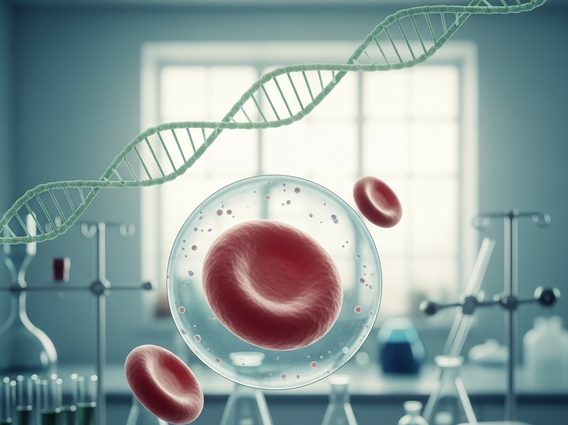Anemia and Cancer
Anemia, a condition characterized by a deficiency of red blood cells or hemoglobin, is a common and often debilitating complication for individuals battling cancer. Understanding the intricate relationship between anemia and cancer is crucial for effective management and improving patient quality of life.

Key Takeaways
- Anemia is highly prevalent among cancer patients, impacting their well-being and treatment tolerance.
- Cancer can cause anemia through various mechanisms, including direct tumor effects, treatment side effects, and chronic inflammation.
- Recognizing and reporting anemia symptoms early is vital for timely intervention.
- Unexplained anemia can sometimes be an early indicator, prompting further investigation for underlying cancer.
- Effective management involves medical treatments like transfusions and ESAs, alongside nutritional and lifestyle support.
What is Anemia and its Link to Cancer?
Anemia is a condition where your blood lacks healthy red blood cells. These cells are responsible for carrying oxygen from your lungs to the rest of your body. When you have anemia, your body doesn’t get enough oxygen, leading to various symptoms.
Defining Anemia: A Blood Disorder
To fully grasp the topic of anemia and cancer, it’s important to first understand what is anemia. It is a blood disorder defined by a lower-than-normal number of red blood cells or a reduced amount of hemoglobin within these cells. Hemoglobin is the iron-rich protein that gives blood its red color and enables red blood cells to transport oxygen. Common types of anemia include iron-deficiency anemia, vitamin-deficiency anemia (e.g., B12 or folate), and anemia of chronic disease.
The Connection Between Anemia and Cancer
The relationship between Anemia and Cancer is significant, with anemia being one of the most common complications experienced by cancer patients. It can arise at any stage of the disease, from diagnosis through treatment and survivorship. The presence of anemia can profoundly affect a patient’s quality of life, impacting their energy levels, physical function, and even their ability to tolerate cancer treatments.
Many patients and caregivers often ask, “What is the link between anemia and cancer?” The link is multifaceted. Cancer itself can directly interfere with red blood cell production, and cancer treatments like chemotherapy and radiation can suppress bone marrow activity, where red blood cells are made. Furthermore, chronic inflammation associated with cancer can hinder the body’s ability to utilize iron effectively, contributing to anemia.
Prevalence and Impact on Patients
The prevalence of anemia varies depending on the type and stage of cancer, as well as the specific treatments received. However, it is estimated that up to 90% of cancer patients may experience anemia at some point during their illness. This high incidence underscores the importance of routine monitoring and proactive management. The impact extends beyond physical symptoms, often leading to increased fatigue, reduced physical activity, and a diminished sense of well-being, which can in turn affect adherence to treatment plans and overall prognosis.
How Cancer Causes Anemia
The mechanisms by which cancer leads to anemia are complex and often involve a combination of factors. Understanding these pathways is key to effective diagnosis and treatment.
Cancer’s Direct Impact on Anemia Development
Cancer can directly cause anemia in several ways. Some tumors, particularly those in the gastrointestinal tract, can lead to chronic blood loss, resulting in iron deficiency anemia. Cancers that spread to the bone marrow (metastatic cancer) can displace healthy blood-forming cells, impairing the production of red blood cells. Additionally, certain cancers or their treatments can cause hemolysis, the premature destruction of red blood cells, further contributing to anemia.
Iron Deficiency and Anemia Risk
One of the most common forms of anemia in cancer patients is iron deficiency anemia. This can occur due to chronic blood loss from tumors, poor nutrition, or impaired iron absorption. The relationship between iron deficiency and cancer risk is also a subject of ongoing research, with some studies suggesting that unexplained iron deficiency in adults warrants investigation for underlying gastrointestinal cancers. Even without direct blood loss, cancer-related inflammation can disrupt iron metabolism, making it difficult for the body to use available iron to produce red blood cells.
- **Chronic Blood Loss:** Tumors, especially in the GI tract, can bleed slowly over time.
- **Impaired Iron Absorption:** Cancer or its treatments can affect the gut’s ability to absorb iron.
- **Inflammation:** Chronic inflammation associated with cancer can trap iron in cells, making it unavailable for red blood cell production.
Other Mechanisms Leading to Anemia in Cancer
Beyond direct impact and iron deficiency, several other factors contribute to anemia in cancer patients. This addresses the question, “How does cancer cause anemia?”
These include:
- **Anemia of Chronic Disease (ACD):** This is a common type of anemia in cancer patients, driven by the inflammatory response to cancer. Inflammatory cytokines interfere with red blood cell production, iron utilization, and red blood cell survival.
- **Chemotherapy and Radiation Therapy:** These treatments, while targeting cancer cells, can also damage healthy bone marrow cells, leading to reduced production of red blood cells.
- **Nutritional Deficiencies:** Cancer and its treatments can cause nausea, vomiting, appetite loss, and malabsorption, leading to deficiencies in essential nutrients like vitamin B12 and folate, which are crucial for red blood cell formation.
- **Kidney Dysfunction:** Some cancers or treatments can affect kidney function, leading to reduced production of erythropoietin, a hormone vital for stimulating red blood cell production in the bone marrow.
Here’s a summary of common causes:
| Category | Specific Cause | Mechanism |
|---|---|---|
| Direct Cancer Effects | Tumor bleeding | Chronic blood loss leading to iron deficiency |
| Direct Cancer Effects | Bone marrow infiltration | Cancer cells displace healthy blood-forming cells |
| Treatment-Related | Chemotherapy/Radiation | Bone marrow suppression, reduced red blood cell production |
| Systemic Effects | Chronic Inflammation | Impaired iron utilization, reduced erythropoietin response |
| Systemic Effects | Nutritional deficiencies | Lack of iron, B12, folate due to poor intake or absorption |
Anemia Symptoms in Cancer Patients
Recognizing the signs of anemia is crucial for cancer patients, as early detection allows for timely intervention and can significantly improve quality of life during treatment.
Recognizing Common Anemia Signs
The Anemia symptoms in cancer patients are often similar to those experienced by individuals with anemia from other causes, but they can be exacerbated by the underlying cancer and its treatments. These symptoms arise because the body’s tissues and organs are not receiving enough oxygen. Common signs include:
- **Fatigue and Weakness:** This is the most prevalent symptom, often described as an overwhelming tiredness that isn’t relieved by rest.
- **Shortness of Breath:** Especially during physical activity, due to the body’s struggle to deliver oxygen.
- **Pale Skin:** Noticeable in the face, lips, nail beds, or inside the eyelids.
- **Dizziness or Lightheadedness:** Particularly when standing up quickly.
- **Cold Hands and Feet:** Poor circulation due to reduced oxygen-carrying capacity.
- **Headaches:** Resulting from insufficient oxygen reaching the brain.
- **Chest Pain or Palpitations:** The heart works harder to compensate for low oxygen levels.
When to Report Anemia Symptoms
It is essential for cancer patients to communicate any new or worsening symptoms to their healthcare team promptly. Even mild symptoms can indicate a significant drop in hemoglobin levels and may require intervention. Patients should be encouraged to keep a symptom diary to track changes and provide accurate information to their doctors. Early reporting can prevent symptoms from becoming severe and impacting treatment schedules or overall well-being.
Impact on Daily Life and Treatment
The pervasive fatigue and other symptoms associated with anemia can severely impact a cancer patient’s daily life. Simple tasks can become exhausting, leading to a loss of independence and reduced participation in social activities. Furthermore, severe anemia can necessitate delays or dose reductions in cancer treatment, potentially compromising its effectiveness. Managing anemia effectively is therefore not just about alleviating symptoms but also about supporting the continuity and success of cancer therapy.
Can Anemia Be a Sign of Cancer?
While anemia is a common complication of established cancer, in some cases, it can also be an early warning sign that prompts a diagnosis of cancer.
Anemia as an Early Indicator
The question, “Can anemia be a sign of cancer?” is an important one, and the answer is yes, it can. Unexplained anemia, particularly iron deficiency anemia in adults, can sometimes be the first clue that an underlying malignancy is present. This is especially true for cancers that cause chronic, subtle blood loss, such as colorectal cancer, stomach cancer, or kidney cancer. The slow bleeding may not be visible but gradually depletes the body’s iron stores, leading to anemia.
Therefore, when a patient presents with new-onset anemia without an obvious cause, healthcare providers will often initiate investigations to rule out malignancy. This diagnostic approach highlights the importance of thorough evaluation of anemia, especially in older adults or those with other risk factors for cancer.
Diagnostic Steps for Anemia in Cancer
When anemia is detected, a series of diagnostic steps are typically followed to determine its cause, especially if cancer is suspected. These steps may include:
- **Complete Blood Count (CBC):** This standard blood test measures hemoglobin levels, red blood cell count, and other blood components.
- **Iron Studies:** Tests like serum iron, ferritin, and total iron-binding capacity help assess iron stores and metabolism.
- **Vitamin B12 and Folate Levels:** To rule out nutritional deficiencies.
- **Stool Occult Blood Test:** To check for hidden blood in the stool, indicating gastrointestinal bleeding.
- **Endoscopy or Colonoscopy:** If GI bleeding is suspected, these procedures allow for direct visualization and biopsy of the digestive tract.
- **Bone Marrow Biopsy:** May be performed if there’s suspicion of cancer affecting the bone marrow or other hematological disorders.
Importance of Timely Diagnosis
Timely diagnosis of anemia, particularly when it points to an underlying cancer, is paramount. Early detection of cancer often leads to more effective treatment options and improved outcomes. For this reason, healthcare providers take unexplained anemia seriously and pursue appropriate diagnostic pathways to identify or rule out malignancy, ensuring that patients receive the care they need as quickly as possible.
Treating Anemia in Cancer Patients
Effective management of anemia is a critical component of comprehensive cancer care. The goal is to alleviate symptoms, improve quality of life, and support the patient’s ability to continue with their cancer treatment.
Medical Interventions for Anemia
Addressing the question of treating anemia in cancer patients involves several medical interventions, tailored to the underlying cause and severity of the anemia. These treatments aim to increase red blood cell count or hemoglobin levels:
- **Blood Transfusions:** For severe or symptomatic anemia, red blood cell transfusions provide a rapid increase in hemoglobin, offering immediate relief from symptoms like severe fatigue and shortness of breath.
- **Iron Supplementation:** If iron deficiency is identified, iron supplements (oral or intravenous) are prescribed to replenish iron stores. Intravenous iron may be preferred for patients who cannot tolerate oral iron or have poor absorption.
- **Erythropoiesis-Stimulating Agents (ESAs):** These medications, such as epoetin alfa or darbepoetin alfa, stimulate the bone marrow to produce more red blood cells. ESAs are typically considered for patients with anemia of chronic disease, particularly those undergoing chemotherapy, to reduce the need for blood transfusions.
- **Addressing Underlying Causes:** Treating the primary cause of anemia, such as stopping tumor bleeding or managing inflammation, is also a crucial part of the overall strategy.
Managing Anemia During Cancer Treatment
Managing anemia during cancer treatment requires a personalized approach and close collaboration between the patient and their oncology team. Regular monitoring of hemoglobin levels through blood tests is essential to track the effectiveness of interventions and adjust treatment plans as needed. The goal is to maintain hemoglobin levels that support the patient’s well-being and allow them to adhere to their cancer therapy without undue fatigue or other debilitating symptoms.
The decision to initiate or modify anemia treatment considers several factors, including the patient’s symptoms, overall health, specific cancer type, and the potential risks and benefits of each intervention. For instance, while ESAs can be beneficial, their use is carefully considered due to potential side effects and specific guidelines for their application in cancer patients.
Balancing Treatment Risks and Benefits
Each medical intervention for anemia carries its own set of risks and benefits. Blood transfusions, while effective, carry risks of allergic reactions or infections. Iron supplements can cause gastrointestinal side effects. ESAs have been associated with potential risks such as blood clots and, in some contexts, may affect tumor progression. Therefore, the healthcare team carefully weighs these factors, discussing them thoroughly with the patient, to make informed decisions that prioritize both anemia management and overall cancer treatment goals.
Dietary and Lifestyle Management for Anemia
Beyond medical interventions, dietary adjustments and lifestyle modifications play a supportive role in managing anemia in cancer patients, helping to improve energy levels and overall well-being.
Nutritional Support for Anemia
While diet alone may not resolve severe anemia, especially in the context of cancer, nutritional support is vital. A diet rich in iron, vitamin B12, and folate can help support red blood cell production and replenish nutrient stores. Key nutrients and their sources include:
- **Iron:** Lean red meat, poultry, fish, fortified cereals, beans, lentils, spinach, and other dark leafy greens. Pairing iron-rich foods with vitamin C (e.g., citrus fruits, bell peppers) can enhance iron absorption.
- **Vitamin B12:** Found primarily in animal products like meat, fish, poultry, eggs, and dairy. Fortified plant-based milks and cereals are options for vegetarians/vegans.
- **Folate (Folic Acid):** Leafy green vegetables, fruits, nuts, beans, peas, and fortified grain products.
It’s important for patients to work with a dietitian or their healthcare team to develop a personalized nutrition plan, especially since cancer and its treatments can affect appetite, taste, and nutrient absorption.
Addressing Iron Deficiency and Cancer Risk
Revisiting the concept of iron deficiency and cancer risk, dietary strategies can be a first line of defense against nutritional deficiencies. While dietary iron intake is important, it may not be sufficient to correct significant iron deficiency in cancer patients, who may require medical iron supplementation. However, maintaining a nutrient-dense diet can prevent further depletion and support overall health. Patients should avoid self-prescribing iron supplements without medical guidance, as excessive iron can be harmful and can mask underlying issues.
Lifestyle Adjustments for Energy Conservation
Managing the fatigue associated with anemia and cancer involves more than just diet. Lifestyle adjustments are crucial for energy conservation and improving daily functioning:
- **Prioritize Rest:** Schedule rest periods throughout the day and ensure adequate sleep at night.
- **Gentle Exercise:** Engage in light physical activity, such as walking, as tolerated. Exercise can help reduce fatigue and improve mood, but it’s important not to overexert.
- **Hydration:** Drink plenty of fluids to prevent dehydration, which can worsen fatigue.
- **Pacing Activities:** Break down tasks into smaller, manageable steps and avoid trying to do too much at once.
- **Seek Support:** Don’t hesitate to ask for help from family and friends with daily chores or errands.
These supportive measures, combined with medical treatment, can significantly enhance a cancer patient’s ability to cope with anemia and maintain a better quality of life.
Frequently Asked Questions About Anemia and Cancer
What is the primary cause of anemia in cancer patients?
Anemia in cancer patients is typically multifactorial. Common causes include bone marrow suppression due to chemotherapy or radiation, chronic inflammation associated with the cancer itself (anemia of chronic disease), blood loss from tumors, and nutritional deficiencies. The specific cause often depends on the type of cancer, its stage, and the treatments being received.
Understanding the underlying cause is crucial for tailoring the most effective treatment strategy, which may involve addressing the cancer directly, providing supplements, or administering blood products.
How is anemia diagnosed in someone with cancer?
Anemia is primarily diagnosed through a Complete Blood Count (CBC), a standard blood test that measures hemoglobin levels, red blood cell count, and other blood components. If anemia is detected, further tests like iron studies (ferritin, serum iron, TIBC) and vitamin B12 and folate levels are often performed to determine the specific type and cause of anemia. Depending on the findings, additional investigations such as stool tests for hidden blood or even a bone marrow biopsy may be necessary.
Can treating anemia improve cancer treatment outcomes?
Yes, managing anemia can significantly improve cancer treatment outcomes and patient quality of life. By reducing fatigue and improving energy levels, patients are often better able to tolerate chemotherapy, radiation, or surgery. This can lead to fewer treatment delays, better adherence to treatment schedules, and potentially more effective cancer control. Improved physical well-being also contributes to better mental health and overall resilience during the challenging cancer journey.
Are there specific diets recommended for anemia in cancer patients?
While a specific “anemia diet” for cancer patients doesn’t replace medical treatment, a nutrient-rich diet can be very supportive. Focus on foods high in iron (e.g., lean meats, fortified cereals, spinach), vitamin B12 (e.g., meat, dairy, fortified plant milks), and folate (e.g., leafy greens, beans). Pairing iron-rich foods with vitamin C sources can enhance iron absorption. It’s best to consult with a registered dietitian specializing in oncology to create a personalized nutrition plan that considers individual needs, treatment side effects, and dietary restrictions.
How often should anemia be monitored during cancer treatment?
The frequency of anemia monitoring depends on several factors, including the type of cancer, the specific cancer treatments being administered, and the patient’s baseline hemoglobin levels. Generally, patients undergoing chemotherapy or radiation will have regular blood tests, often before each treatment cycle, to monitor their blood counts, including hemoglobin. If anemia is severe or symptomatic, monitoring may be more frequent. The oncology team will establish a monitoring schedule based on clinical guidelines and the individual patient’s condition.
What are the long-term effects of unmanaged anemia in cancer?
Unmanaged anemia in cancer patients can lead to a range of debilitating long-term effects. These include persistent and severe fatigue, significantly reduced quality of life, decreased physical activity, and impaired cognitive function. It can also increase the risk of cardiovascular complications as the heart works harder to compensate for low oxygen levels. Furthermore, unmanaged anemia can force delays or reductions in cancer treatment, potentially impacting the overall effectiveness of therapy and long-term prognosis. Therefore, proactive management is essential for both immediate symptom relief and long-term well-being.
Disclaimer: The information provided in this article is for supportive purposes only and does not replace professional medical advice. Readers should always consult their doctor or healthcare provider for any health concerns or before making any decisions related to their health or treatment.






Warning: Undefined variable $aria_req in /var/www/html/wp-content/themes/Impreza-child/comments.php on line 51
Warning: Undefined variable $aria_req in /var/www/html/wp-content/themes/Impreza-child/comments.php on line 56
Warning: Undefined variable $aria_req in /var/www/html/wp-content/themes/Impreza-child/comments.php on line 67
Warning: Undefined variable $aria_req in /var/www/html/wp-content/themes/Impreza-child/comments.php on line 70
Warning: Undefined variable $aria_req in /var/www/html/wp-content/themes/Impreza-child/comments.php on line 73